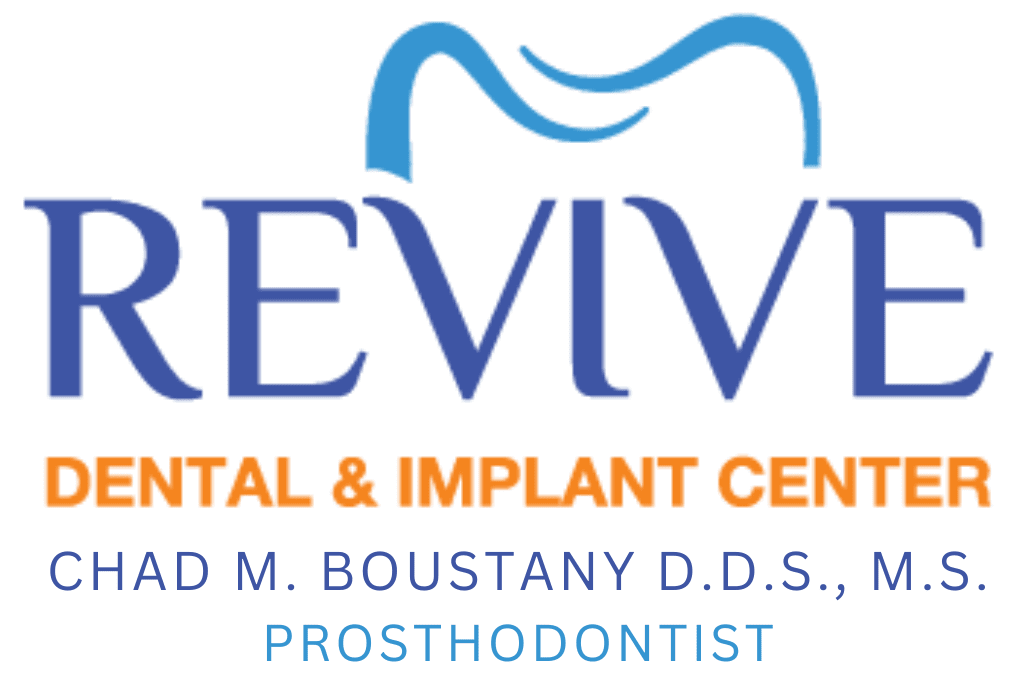In the past, the only available replacement for missing teeth was a removable denture composed entirely of acrylic material. With the advancement of dental science, however, most patients now have a wealth of choices to restore a healthy, beautiful smile. Today, we’ll compare two methods: Dentures and All-On-4. With this information, we hope to give you a better understanding of both treatments and help settle any doubts you may have as to which is preferable for your case.
If you are edentulous (meaning you’ve lost most or all of your teeth) or know someone who is and have any questions about dentures or All-On-4® Treatment Concept restorations, please feel free to call Revive Dental and Implant Center today and set up an appointment at 304-396-6658.
All-on-4 Implants vs. Dentures
The significant factors to consider when choosing the best solution for your tooth replacement needs will be discussed during your consultation with Dr. Boustany. We aim to educate our patients on all of their treatment options so that they can make an informed choice.
- Cost vs. Investment: All-on-4 implants require a significant upfront investment but may be more economical long-term, while dentures are more affordable initially but require ongoing maintenance and replacements.
- Function and Comfort: All-on-4 implants provide superior stability, bite force (80-90% of natural teeth), and comfort similar to natural teeth, whereas dentures offer limited bite force (25-50%), can slip during use, and may cause discomfort.
- Bone Health and Appearance: All-on-4 implants stimulate and preserve jawbone, maintaining facial structure, while dentures don’t prevent bone loss, which can lead to facial changes and fit issues over time.
- Maintenance and Longevity: With regular dental care and good oral hygiene, all-on-4 implants can last decades, while dentures require daily removal for cleaning, periodic relines, and replacement every 5-10 years.

Advantages of All-On-4 Treatment
This treatment is designed to replace several teeth at once using a prosthetic dental bridge structure supported by four implants (titanium screw-like objects anchored into your jawbone to act as new tooth roots). With two implants surgically embedded at specific points in your upper jaw and two in the lower jaw, they work together to keep the prosthetic properly fixed in place. Integrating biologically with the bone over time, this creates a sturdy foundation to preserve your new smile without a need for bone grafting.
The All-On-4 treatment offers numerous benefits for patients seeking full-arch dental restoration. This innovative approach provides immediate and lasting improvements to both function and aesthetics:
- Immediate quality of life improvement with a fixed full-arch prosthesis on the day of surgery, enhancing appearance, function, speech, and self-confidence.
- Efficient treatment timeline with faster completion compared to traditional methods.
- Proven reliability with consistently high success rates.
- Easy maintenance due to strategic implant positioning that facilitates cleaning.
- Practical flexibility as the final restoration can be repaired or removed if necessary.
The angled implant placement technique provides significant advantages. By accessing higher-quality bone at the back of the mouth, it creates a stronger foundation for the prosthesis. This strategic positioning also avoids interference with surrounding anatomical structures of the mouth and face, ensuring better integration and comfort. One of the most notable benefits is the elimination of time-consuming bone grafting procedures, which significantly reduces treatment time and recovery. Additionally, this approach reduces the posterior cantilever (tooth bridge), resulting in better overall stability of the restoration. Cost-effectiveness is another key advantage, as the technique requires fewer implants and typically avoids the need for bone grafts, making the All-On-4 treatment more accessible to patients seeking full-arch restoration.
Disadvantages of All-On-4 Treatment
Despite its many benefits, the All-On-4 treatment does present some challenges:
- Technical Complexity: Implant placement is prosthetically dictated, making free-hand positioning sometimes impossible and more challenging.
- Design Limitations: The cantilever used in the prosthesis cannot exceed its maximum length in proportion to the mouth.
- Surgical Precision Requirements: The procedure demands careful preparation and sensitive techniques, including surgical splints and CAD/CAM (computer-aided design and computer-aided manufacturing) technology
